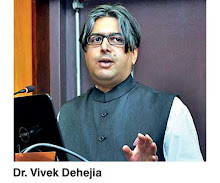AS THE ARTICLE MAY BE PAYWALLED, THE TEXT OF THE ARTICLE, AS FILED, IS PLACED BELOW.
Speculating on, and then dissecting, a reshuffle in the Union Council of Ministers is a parlour game for political analysts and observers, but what consequence is there for the rest of us? In other words, apart from gossip on “who is in” and “who is out” and why these changes may have occurred, is there any reason for more than passing interest by those of us who do not sit in the Delhi durbar of one or the other politician (either on the way up or the way down) of any particular political stripe and who thus may have a personal interest in the matter?
The short answer is: not really. As long back as 2015, during the first year of the first term in office of Prime Minister Narendra Modi’s government, I wrote a column in these pages asking, “Do expert ministers lead to better policy outcomes?” (16 January 2015). The context at that time was a volley of criticism against Smriti Irani, who was at that time was Minister of Human Resource Development, and the basis of the criticism was that she did not hold a university degree. There was also widespread praise for Jayant Sinha at that time, who was then Minister of State for Finance, given his background in management and finance.
Since that time, there have been several cabinet reshuffles, most significantly, of course, in Modi’s second term of office that commenced in 2019. But would one say that the appointment of X or the removal of Y from ministry A or B has had a marked impact on the overall public policy record, whether good, bad, or indifferent, of the Modi government? One would be hard-pressed to answer “yes”.
As my 2015 piece argued, the notion that expert ministers make a difference, while it sounds intuitively appealing, is difficult to find in the data, when one studies Cabinet systems of government in various countries and various points in time. The one exception appears to be a time of economic or financial crisis, such as after India’s crisis in 1991, when having a finance minister and/or central bank governor with expert credentials appears to make a difference — but not for the reason that you might think, but rather that the appointment of a domain expert sends a signal to the financial markets that the government is serious about fixing the underlying problems that led to the crisis. So perhaps domain expertise is, at best, more about signalling than it is about any concrete difference that a particular individual makes in a particular ministerial post.
There is an additional reason worth noting. As your columnist has observed on numerous occasions, our inherited Westminster parliamentary system of government is remarkably malleable. Thus, at a time when the leading party depends heavily on the support of coalition partners, such as during the two terms of Prime Minister Manmohan Singh (2004 - 2014), appointments to the Council of Ministers could be seen as carrots to other parties in the coalition. Ministers, in such a situation, may have actual clout, and thus could make a tangible difference, as their position cements a coalition partnership. But, as we have seen during the Singh years, this is a mixed blessing: some of the alleged corruption scams of those years, as the reader will recall, were blamed on Singh’s inability, or unwillingness, to sack non-performing or otherwise problematic ministers, for fear of upsetting the coalition dharma.
The situation is very different under the current government. Unlike the Singh years, characterized by a weak prime minister whose remit was limited to “policy” but did not include delving into “politics”, Modi’s Bharatiya Janata Party has led strong majority governments in both terms. Another interesting feature of the Westminster system is that, with a strong majority, overall Cabinet responsibility can morph into a quasi-Presidential system, in which the individual at the top, the Prime Minister, functions rather more like a chief executive than a first amongst equals. That has most certainly been the case under Modi, where it is no secret that important decisions are made, and routed through, the Prime Minister’s Office (PMO). Indeed, the burgeoning size of the PMO staff under Modi is a sign of its increased importance in the overall scheme of things. In such a situation, individual ministers are little more than placeholders, who may be shuffled around, while key decisions rest with the Prime Minister and are guided more by inputs from his advisers and senior bureaucrats in his office than they are by the ministers nominally in charge of the various portfolios.
There is nothing peculiar or uniquely Indian about this, and the current strong government, led from the PMO, is most assuredly not a sign of a weakening of India’s democratic credentials, as some foreign observers have suggested. Rather, it is precisely how the Westminster system functions when the governing party has a strong majority and is led by a strong prime minister who has a firm grip on his party. This would exactly describe the United Kingdom under Margaret Thatcher (1979 - 1990) or Canada under Jean Chrétien (1993 - 2003). Indeed, Chrétien, a French Canadian, centralized power so much in his PMO, with his ministers largely ciphers, that he was ironically dubbed the “sun king”, in reference to the absolutist French monarch Louis XIV.
All of this is worth remembering as some of us play the parlour game of deciphering the meanings behind the latest reshuffle.
Vivek Dehejia is associate professor of economics and philosophy at Carleton University, Ottawa, Canada.

No comments:
Post a Comment